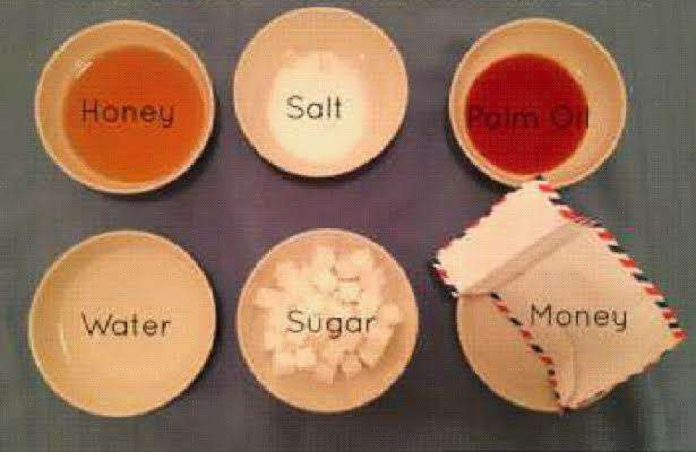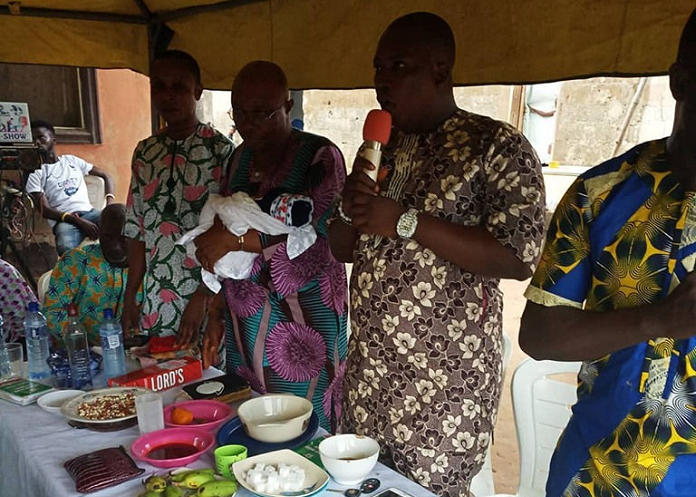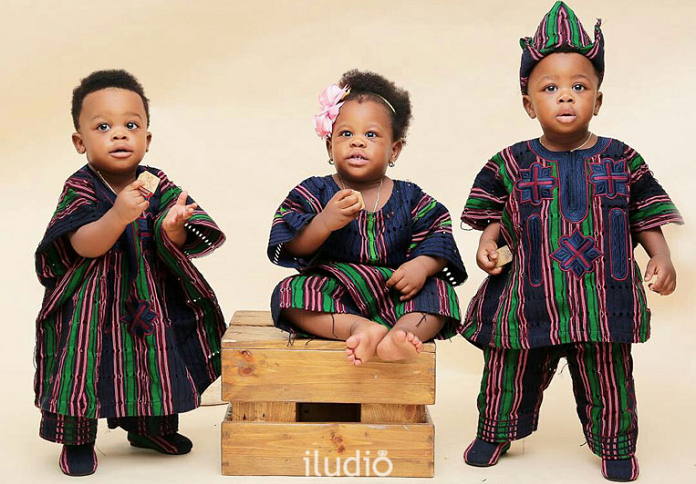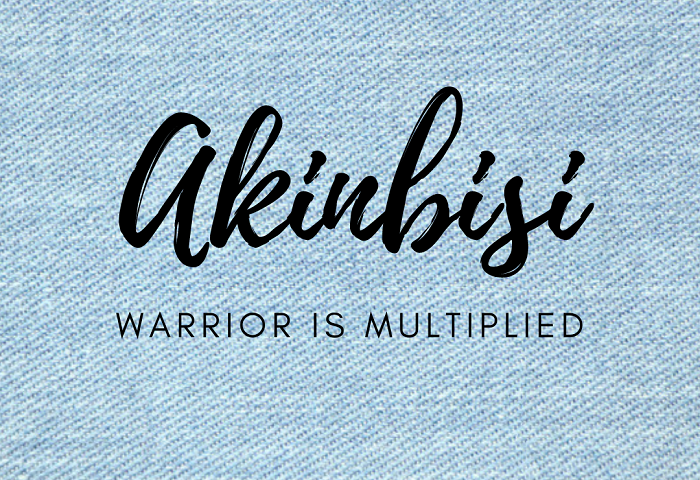Names are unique and they say a lot about the bearer. What you call your child at birth is important because it becomes the identity of the one that bears the name. Some parents give their children names based on conditions surrounding their birth. Others give their children certain names just because they admire them. In Nigeria, parents name their children because of these reasons and more. Because of the diverse tribes and cultures in Nigeria, parents prefer to give their children names with a cultural undertone. These cultural names come in their language and sometimes have deep meanings. This style of naming a child helps retain the culture and tradition and gives the child an identity. A look at some Yoruba names and meanings for both males and females will shed more light on what they stand for.
The Yoruba Naming Ceremony
The Yorubas dominate the western part of Nigeria and the people attach so much importance to the naming ceremony of a child. In their culture, names are given based on the circumstance surrounding the birth of the baby. For instance, in twin births, the first is called Taiyewo, shortened as Taiwo or Taiye, while the second is named Kehinde, shortened as Kenny. This is to identify which child came first (taster) and the one that came later (late arrival). It is believed that the first was sent by the second to check whether the place is good. If the place is good, it would stay, and the second would read the signal and come out.
In the traditional Yoruba land, a male child is named seven days after its birth, while a female child is named on the ninth day. Twins of the same sex follow this norm while twins of different sexes – boy and girl are named on the eighth day. However, these norms are violated mainly in Muslim homes. Muslims name their children, both male and female, on the eighth day. Some families name a baby according to tradition, while others name it according to religion. The traditional ones believe in naming according to family history and the belief in predestination.

The naming ceremony is called Iso Omo Loruko and it is performed by the oldest in the family. Certain items are needed for the blessing of the baby. They include; alligator pepper (atare), honey, palm oil, water, sugarcane, sugar, kola nut, salt, bitter kola, and liquor. These items are used to pray for the child. Because of how important the ceremony is, these items have special meanings in the child’s life. Sugar and honey represent sweetness, and the prayer is that the baby’s life is sweet like sugar and honey. This goes for all other items. A priest prays for the baby, and the chosen name is conferred on the child.
Equally important, in Yoruba land, the relations of the baby also give the baby names. They drop monetary gifts in a bowl in front of the baby’s parents and give the baby their own special names. This means that after the naming ceremony, the baby will be left with a lot of names. Moreover, the names are written down for the child. All these make the Yoruba naming ceremony important and unique.

However, there is no particular Yoruba community that we can say these names originated from. The names are commonly distributed among Yoruba people, and there are no limitations to which tribe should answer what name.
5 Classes of Yoruba Names
Yoruba names can be classified into five. These groups of names are given under different conditions.
Acquired Names (Oruko Abiso)
These names are given during the naming ceremony. They are not natural names; rather, they are derived from the circumstances that led to the birth of a child. They are also given in reference to the family’s traditional vocation. Examples of these names are; Omotayo (A child is worth the joy), Aderonke (The crown has found something worth nourishing), Adeyinka (Crown surrounded me), Morenike (I have gotten one to pamper).
Destiny Names (Oruko Amutorunwa)
These names are derived from a traditional and religious background. It is believed that some babies are born with their pre-destined names as we have in twins. The birth of these babies confers a name to them immediately. Examples of these special babies and their names include the following; Twins – the first is called Taiye/Taiwo, while the second is called Kehinde.
The child that follows twins is called Idowu while the next is called Alaba. Ajayi is given to a child that is born with its face downwards. For a child that is born with an umbilical cord around the neck, the male is called Ojo while the female is called Aina. A child that came out with the legs instead of the head is called Ige. A child that is born without menstruation is called Ilori.
Panegyrics (Oruko Oriki)
These are praise names that are used to inspire the bearers of such names. The name is given to recite the achievement of the family a child is born into or to describe the child’s future destiny. Oriki names are given to praise or describe a certain character trait a child is born into or to summon those features with the name given to such a child. Examples of Oriki names are; Akanni (our encounter brings wealth), Agbeke (to carry and pamper), Asabi (one of select birth).
Alias (Oruko Inagije)
These names are given in addition to the already given names. they are; Eyinafe (fanciful teeth), Awelewa (the beautiful one), Opelenge (thin/slender).
Oruko Abiku
According to Yoruba tradition, Abiku is the children that keep dying at birth or before they become adults. If the death keeps re-occurring, then they conclude that it is the same child who is coming back just to die. The child is seen as one who has come to torment the parents, and when one decides to stay, these names are given to them in order to urge them to stay. Examples of these names include the following; Durosinmi (Wait to rest), Durotimi (Stay with me), Kosoko (There is no hoe anymore; means there is no more hoes to dig graves), Orukotan (All names have been exhausted), Malomo (Do not go again).
Yoruba Names For Boys And Their Meanings
Below is a list of Yoruba names for boys and their meanings
1. Akinbisi
- Meaning: Warrior is multiplied
- Historical significance: From a warrior family
- Short form: Bisi, Akin
2. Abioye
- Meaning: The son of royalty, Born into royalty
- Historical significance: The name is for the upper class and royalty
- Short form: Oye
3. Adegoke
- Meaning: An heir to the throne, the crown has been exalted
- Historical significance: Royalty
- Short form: Ade
4. Adelomo
- Meaning: A child is a crown
- Historical significance: Praise of a child
- Short form: Delomo
5. Adewole
- Meaning: Crown enters the house
- Historical significance: Royalty
- Short form: Wole, Ade
6. Akintayo
- Meaning: Warrior is enough for joy
- Historical significance: From a warrior family
- Short form: Tayo, Akin
7. Aremo
- Meaning: First male child of a king/crown prince
- Historical significance: Royalty
- Short form: Aremo
8. Folarin
- Meaning: Walking with wealth
- Historical significance: Praise of a child
- Short form: Fola
9. Adedeji
- Meaning: The crown/king/royalty has become two
- Historical significance: Royalty
- Short form: Deji, Ade
10. Babatunde/Babatunji
- Meaning: Father has come back
- Historical significance: Given to a male child born immediately after the demise of the father
- Short form: Tunde/Tunji
11. Oluwafemi
- Meaning: The Lord loves me
- Historical significance: Acknowledgement and praise of God
- Short form: Femi
12. Oluwatimileyin
- Meaning: The Lord supports me
- Historical significance: Acknowledgement and praise of God
- Short form: Timileyin, Timmy
13. Adewale
- Meaning: Crown comes home
- Historical significance: Royalty
- Short form: Wale, Ade
14. Kayode
- Meaning: He brought joy
- Historical significance: Given to a male child that came after a long wait
- Short form: Kayode
15. Olabode
- Meaning: Wealth has come home
- Historical significance: This is given to a child who brought wealth to his home or anticipated that the child would bring wealth to the family. There is a belief that a male child brings wealth.
- Short form: Ola, Bode
16. Oluwadamilare
- Meaning: God has vindicated me
- Historical significance: Acknowledgement and praise of God
- Short form: Damilare, Dare
17. Oladimeji
- Meaning: Wealth has doubled
- Historical significance: There is a belief that a male child brings wealth to the family; therefore, a second male child means double wealth
- Short form: Dimeji
18. Omotoso
- Meaning: A child is enough for beautification
- Historical significance: The importance and beauty that a child adds to the family
- Short form: Toso
19. Adekunle
- Meaning: Crown fills the home
- Historical significance: Royalty
- Short form: Ade, Dekunle, Kunle
20. Obafemi
- Meaning: The king loves me
- Historical significance: Royalty
- Short form: Femi, Oba
21. Adetayo
- Meaning: Crown brought joy
- Historical significance: Royalty
- Short form: Tayo, Ade
22. Tomori
- Meaning: We have seen a baby again
- Historical significance: This child came years after a previous birth
- Short form: Tomori
23. Olamilekan
- Meaning: My wealth is greater, or my wealth has been added to
- Historical significance: Another male child was added to other male children
- Short form: Lekan, Ola
24. Olanrewaju
- Meaning: My wealth is in the future
- Historical significance: Hope for future wealth
- Short form: Lanre
25. Segun
- Meaning: God’s strength
- Historical significance: Acknowledgement and praise of God
- Short form: Segun
Yoruba Names For Girls And Their Meanings
26. Titilayo
- Meaning: Forever is joy
- Historical significance: The birth of the child brings more joy and prolongs the joy.
- Short form: Titi, Layo
27. Adenike
- Meaning: The crown needs to be taken care of
- Historical significance: Royalty
- Short form: Nike
28. Aderiyike
- Meaning: The pampered crown
- Historical significance: Royalty
- Short form: Riyike
29. Atinuke
- Meaning: Pampered from the womb
- Historical significance: A name given to a long-awaited female child
- Short form: Tinuke
30. Ewatomi
- Meaning: Beauty is enough for me
- Historical significance: In praise of a child’s beauty
- Short form: Tomi, Ewa
31. Bolanle
- Meaning: A child that meets wealth at home
- Historical significance: Born in the abundance of wealth or after series of male children
- Short form: Bola
32. Abebi
- Meaning: We asked for a girl child
- Historical significance: A girl child that comes at the prayers and requests of the parents
- Short form: Abebi
33. Fehintola
- Meaning: Resting on wealth
- Historical significance: This child came in abundance
- Short form: Tola
34. Adesewa
- Meaning: The crown of beauty
- Historical significance: Praise of a child
- Short form: Ade, Sewa
35. Folake
- Meaning: A child that is taken care of with a wealth
- Historical significance: A child born into a wealthy family
- Short form: Folake
36. Feyisayo
- Meaning: Used as joy
- Historical significance: The child is sweet because it brought happiness
- Short form: Feyi, Sayo
37. Doyinsola
- Meaning: My wealth is sweet/filled with honey
- Historical significance: Importance, sweetness, and praise of a child
- Short form: Sola or Doyin
38. Omorinsola
- Meaning: The child walks into riches
- Historical significance: A child born into a wealthy family
- Short form: Rinsola, sola
39. Ibironke
- Meaning: They have gotten something to care for/family will love this child.
- Historical significance: Importance and praise of a child
- Short form: Ronke
40. Foyinsola
- Meaning: Use honey to enjoy wealth/add honey to the wealth
- Historical significance: Sweetness of a child
- Short form: Sola, Foyin
41. Gbemisola
- Meaning: Carry me into wealth
- Historical significance:
- Short form: Gbemi or Sola
42. Ibidun
- Meaning: Family is sweet/the birth was sweet
- Historical significance: Praise of family, child, and child-bearing
- Short form: Ibidun
43. Fadekemi
- Meaning: Take care of me with crown
- Historical significance: Praise of a child
- Short form: Kemi
44. Olatundun
- Meaning: Wealth is sweet again
- Historical significance: The coming of the child brings happiness to a wealthy home
- Short form: Tundun, Ola
45. Oluwabusayo
- Meaning: God adds to my joy
- Historical significance: Acknowledgement and praise of God
- Short form: Busayo
46. Yetunde
- Meaning: Mother has come back
- Historical significance: The belief in reincarnation. Given to a female child born after the demise of her grandmother
- Short form: Yetunde
47. Oluwafunmilayo
- Meaning: God has brought me joy
- Historical significance: Acknowledgement and praise of God
- Short form: Funmi, Funmilayo
48. Kikelemo
- Meaning: A child is to be pampered or spoiled
- Historical significance: In praise of a child
- Short form: Kike
49. Folashade
- Meaning: Use honor or wealth to confer a crown/ honor bestows crown
- Historical significance:
- Short form: Fola, Shade
50. Morenike
- Meaning: I have gotten one to pamper
- Historical significance: In praise of a child
- Short form: Mornike
5 Most Common Unisex Yoruba Names in Nigeria
In addition to the foregoing, there are certain names that are unisex. They can be given to both boys and girls. This is found in many cultures. In Yoruba land, some of these names include the following.
1. Eniola
- Meaning: A child of wealth
- Historical significance: In praise of a child
- Short form: Eniola
2. Durotimi
- Meaning: Stay with me
- Historical significance: The name is given to Abiku. Abiku is attributed to children that are born to die. They die and come back to be reborn. Such names are given to them to urge them to stay and not die again.
- Short form: Rotimi
3. Temitope
- Meaning: Mine is worthy of praise
- Historical significance: Expression of gratitude by parents
- Short form: Temi, Tope
4. Abidemi
- Meaning: Born in the father’s absence
- Historical significance: This name is given to children who were given birth to or named in the father’s absence. Maybe the father traveled but is still alive.
- Short form: Abidemi
5. Abiola
- Meaning: Born in honor or wealth
- Historical significance: The name is given to a child born in an abundance of wealth
- Short form: Biola



